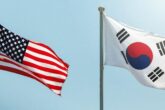February 02, 2021
What South Korea and China Do Together on North Korea Depends on Biden
During the first phone exchange between Beijing and Seoul in eight months, Chinese president Xi Jinping issued multiple diplomatic signals to the new Biden administration, suggesting China’s vision for the Korean Peninsula and its goals for the future of Sino-South Korean relations. Although President Xi reportedly stated that the denuclearization of the Korean Peninsula is a mutual interest for both Beijing and Seoul, there is reasonable concern that his perception of denuclearization mirrors that of North Korea’s national initiative: a peninsula void of U.S. military and security presence.
As Beijing will pounce on any signs of wavering U.S. leadership or support, it is imperative for the Biden administration to quickly resume its leadership role in Asia through multilateral engagement.
The continued presence of U.S. troops, frequent joint military exercises, and the U.S. deployment of the Terminal High Altitude Area Defense (THAAD) anti-missile battery system in South Korea has led to a barrage of Chinese economic coercive measures, such as business closures and travel bans, against Seoul. Despite diplomatic threats of “destroying” the Sino-South Korean relationship and subsequently damaging the South Korean economy, Beijing failed to bully Seoul into abandoning the deployment of THAAD and ultimately led to a 19 percent decrease in South Korean public support for strengthening ties with China. Moreover, the discord between the people of China and South Korea continued to grow as more than half a million South Koreans signed a petition calling for a ban on Chinese visitors due to the coronavirus outbreak, and Chinese state media openly criticized world-famous K-pop group BTS for commemorating the American and Korean lives lost during the Korean War with no mention of China. While President Xi and President Moon spoke of promoting “high-level exchanges” between their countries, it is unlikely that the majority of the Chinese and South Korean public will embrace each other with similar vigor.
Read the full article from The National Interest.
More from CNAS
-
Trump-Lee Summit
Duyeon Kim, adjunct senior fellow at the Center for a New American Security joins CNN to discuss the Trump-Lee Summit and the concerns should U.S. troops pivot to focus on Chi...
By Dr. Duyeon Kim
-
Upcoming Trump-Lee Summit: Modernizing the Alliance by First Reaffirming Long-Standing Principles
Trump and Lee could reaffirm their country’s commitment to the alliance amid shifting security dynamics and agree to modernize it in broad terms to meet the needs of today and...
By Dr. Duyeon Kim
-
South Korea-U.S. Launch Ulchi Drills as Kim Slams Exercise as “Hostile”
With North Korea's growing alignment with Moscow, plus renewed great-power diplomacy following President Trump's latest call with President Putin, the Korean Peninsula is once...
By Dr. Go Myong-Hyun
-
Indo-Pacific Security / Energy, Economics & Security
75 Years Post-Korean War: Can Trust Be Rebuilt Under the New Administration?As President Lee Jae Myung begins his term, he's taking visible steps to reset the tone with North Korea: halting propaganda broadcasts and reemphasizing past military agreeme...
By Dr. Go Myong-Hyun



